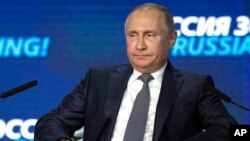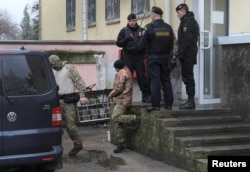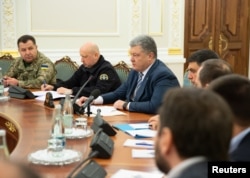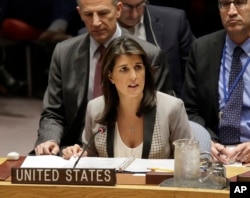Russian President Vladimir Putin says Ukrainian President Petro Poroshenko is responsible for the standoff with Ukrainian naval ships in the Black Sea, contending it is an attempt by Poroshenko to boost his re-election chances next year.
In a televised speech Wednesday, Putin accused Poroshenko of orchestrating a “provocation” by Ukrainian vessels for the sole purpose of winning re-election.
Meanwhile, Russia’s military said it is adding more anti-aircraft missiles to its defense systems in the Russian-annexed Crimean Peninsula.
On Sunday, Russian forces seized three Ukrainian vessels and their crews in the Black Sea.
Russia accused the 24 sailors who were manning the ships of illegally entering Russian waters and ignoring warnings from Russian border guards, charges Ukraine has denied.
On Tuesday, a court in Crimea ordered 12 of the 24 sailors apprehended to be detained for two months. The rest of the group was scheduled to be in court Wednesday.
Ukraine has imposed martial law in some of its border regions in response to the incident and, with a growing number of other European countries, urged Western allies to impose additional sanctions on Moscow.
Poroshenko said martial law will help “strengthen Ukraine’s defense capabilities amid increasing aggression and according to international law, a cold act of aggression by the Russian Federation.” He demanded Russia release the Ukrainian sailors and vessels.
Putin voiced concern about the decision to impose martial law and told German Chancellor Angela Merkel he hoped Berlin could influence Ukraine to avoid any “reckless acts.”
Putin is to meet this week with U.S. President Donald Trump as leaders from the G-20 group of advanced and emerging economies gather for a summit in Argentina.
But in an interview with The Washington Post, Trump said “maybe I won’t have the meeting.”
Trump said the decision would depend on his reading of a full report on the situation he was to receive late Tuesday, adding, “I don’t like that aggression.”
Kremlin foreign affairs adviser Yuri Ushakov said Wednesday the meeting had been scheduled through official channels and that Russia had not received any information about canceling the meeting.
The U.S. ambassador to the United Nations, Nikki Haley, condemned Russia earlier this week for what she called its “outrageous violation of sovereign Ukrainian territory.”
“This is no way for a law-abiding civilized nation to act,” Haley said at a Monday emergency meeting of the U.N. Security Council.
White House spokeswoman Sarah Sanders said Trump and Turkish President Recep Tayyip Erdoğan discussed the issue by phone Wednesday.
“The two leaders expressed deep concern about the incident in the Kerch Strait and the continued detainment of Ukraine’s vessels and crew members,” Sanders said in a statement. “They agreed to meet again at G-20 to discuss this concern and other important issues in the bilateral relationship.”
Sunday’s incident began when a Ukrainian tugboat set out to escort two navy ships from Odessa, on the Black Sea, through the Kerch Strait to the Ukrainian port of Mariupol, in the Sea of Azov.
The Kerch Strait is the only passage between the two seas.
Ukraine said Russia used a tanker to block access to the Kerch Strait, which under a treaty is shared territory.
The U.S. special envoy for Ukraine, Kurt Volker, told reporters in Berlin Wednesday he believes Kyiv’s account that its ships were operating within global maritime rules.
Volker said the Ukrainian vessels were returning to Odessa “when the Russian vessels then pursued them and attacked them.”
Ukrainian officials have released what they maintain is the precise location where its ships were fired upon.
Volker said he has not received independent U.S. verification of Ukraine’s information but believed “the data the Ukrainians have provided is quite clear.”
Russia annexed the Crimean Peninsula in March 2014, claiming its ethnic Russian majority was under threat from the Ukrainian government. A month later, it fomented a pro-Russia separatist rebellion in eastern Ukraine in an ongoing conflict that to date has claimed more than 10,000 lives.
Ukraine and the West repeatedly have accused Russia of fueling the conflict by providing rebel forces with weapons and other support, a charge Moscow denied despite strong evidence to the contrary.









